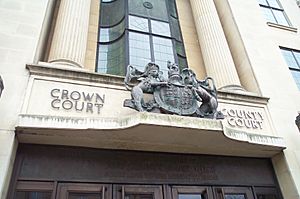County Court (England and Wales) facts for kids
The County Court is a special court in England and Wales. It handles disagreements between people or groups. These disagreements are called civil cases. This court can deal with cases of any money value.
The County Court is not in just one place. It has many buildings and courtrooms. These are found all over England and Wales. It is one big system, even though it has many locations.
Contents
A Look Back: How the County Court Started
The story of the County Court is quite old. It goes back to early German times. A Roman historian named Tacitus wrote about something called a Comitatus. This was a military group. Later, in Anglo Saxon England (450-1066), the Comitatus became a court. It was no longer a military group.
In Anglo Saxon England, courts were called gemot. The shire court was an early type of local government. After the Norman conquest of England in 1066, courts changed more. England was divided into areas called shires. Officials called shire reeves or sheriffs ran these areas.
The main job of these early courts was to hear civil cases. There were many separate county courts. Each one handled cases from its own area.
The modern County Court was created in 1846. This happened with the County Courts Act 1846. This law made it easier and cheaper to solve small money problems. Before this, it was often too difficult or costly. The new court system was much better.
Later, the County Courts Act 1867 gave the new court system more power. It took over most cases from older local courts. In 1971, the Courts Act 1971 changed things again. Judges in the County Court are now called circuit judges. Since 2014, England and Wales has one official County Court. It can handle civil cases of any money value.
How Cases Work in the County Court
You can start a case at a County Court in different ways. You can go in person or send it by mail. Some cases can even be started online. Usually, cases are heard at the court closest to where the person making the claim lives.
Most cases are decided by a judge alone. These judges are called district judges or circuit judges. In civil cases in England, there are usually no juries. Judges in the County Court used to be lawyers. They were either barristers or solicitors.
Small Claims: What Are They?
If someone is asking for less than £10,000, it is a "small claim." These cases are handled in the County Court. They are part of the "small claims track." People sometimes call it "small claims court," but it is not a separate court. It is just a way the County Court handles smaller cases.
For claims between £5,000 and £25,000, they go on the "fast track." These cases can usually be finished in one day. Claims over £25,000 go on the "multi track." These "tracks" help the court manage different types of cases. The actual cases are still heard in the County Court or the High Court. The amount of money involved helps decide which track a case takes.
What Happens if You Disagree with a Decision?
If you disagree with a judge's decision, you can appeal. This means you ask a higher judge to look at the case again. If a district judge made the decision, a circuit judge hears the appeal. If a circuit judge made the decision, the appeal goes to the High Court of Justice or the Court of Appeal.
Making Sure Decisions Are Followed
If someone wins a debt case, they get a "County Court judgment." This is a legal order saying the debt must be paid. If the debt is not paid, the person who won can ask the court to help.
The court can send bailiffs to take goods from the person who owes money. These goods can be sold to pay the debt. Another way is an "Attachment of Earnings Order." This tells the employer of the person who owes money to take payments directly from their wages. These payments then go to the person who is owed money.
County Court judgments are recorded. This information goes into the Register of Judgments, Orders and Fines. It also goes into credit records. This can make it harder or more expensive for someone to borrow money in the future. If the debt is paid within 30 days, the record might not stay for long. But if it's not paid, the record can stay for six years.
 | John T. Biggers |
 | Thomas Blackshear |
 | Mark Bradford |
 | Beverly Buchanan |


